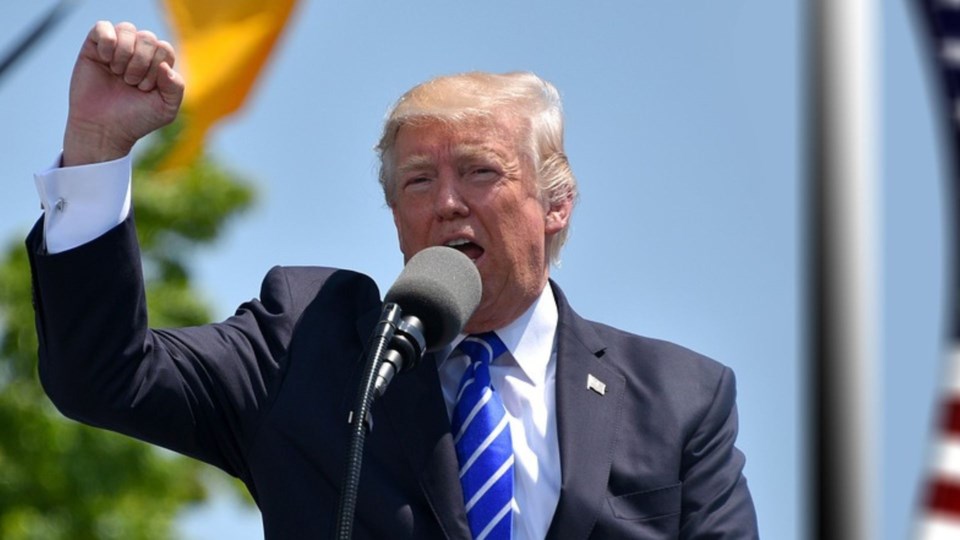Days from the second presidential inauguration of Donald Trump, Canadians are not in a good mood. If 2020 brought a unique opportunity to look down on our southern neighbours for the evident mishandling of the COVID-19 pandemic, 2025 brings renewed expansionist rhetoric related to Canada, Greenland and Mexico.
Trump’s musings about Canada becoming an American state are new, but the flirtation of some Canadians with the idea is not. In December 2019, we reported that 16 per cent of Canadians—and 27 per cent of those aged 18 to 34—thought their province would be better off joining the United States. Five years later, the proportions rose to 26 per cent and 40 per cent, respectively.
Our latest survey, conducted before Prime Minister Justin Trudeau announced his resignation, shows a similar age gap on most questions. Young Canadians are more likely to give Trump the “benefit of the doubt” (again) than their older counterparts.
As the presidency of Joe Biden draws to a close, just over half of Canadians (51 per cent, up three points since May 2024) believe his tenure was “very good” or “good” for Canada, while a third (32 per cent, up two points) consider it “bad” or “very bad.”
Canadians who voted for the federal Liberal Party or NDP in 2021 are more likely to look at Biden’s tenure fondly (70 per cent and 64 per cent). Just a third of Conservative Party voters (33 per cent) share this feeling.
The numbers flip when Canadians are asked about their expectations for Trump’s second term. Only one-third (33 per cent) think it will be “very good” or “good” for Canada, while a majority (54 per cent) expect it to be “bad” or “very bad.”
Age tells a compelling story. While only 18 per cent of Canadians aged 55 and over think Trump’s tenure will be positive for our country, the proportions are higher for those aged 35 to 54 (33 per cent) and those aged 18 to 34 (48 per cent).
When Canadians were asked to select an emotion to express their feelings about Trump taking office, 23 per cent picked “disgust,” followed by “fear” (19 per cent) and “surprise” (12 per cent). Fewer than one in 10 expressed “trust” (nine per cent), “joy” (eight per cent), “anticipation” (also eight per cent), “sadness” (six per cent) and “anger” (five per cent).
Notably, Canadians aged 18 to 34 are more likely to express “trust” (16 per cent) than “disgust” (12 per cent) when pondering the president-elect. The gap is enormous among those aged 55 and over: 32 per cent experience “disgust” and only three per cent say “trust.”
Some Canadians are trying to vote with their wallet. Across the country, 16 per cent have avoided purchasing U.S. goods if a non-American alternative was available, 13 per cent have cancelled a planned trip to the U.S. and 11 per cent have avoided American restaurant franchises in Canada.
Majorities of Canadians think Trump’s tenure will have a negative impact on the world (59 per cent), on Canada (59 per cent) and on their province (56 per cent), while at least three in five expect a decline in the fight against climate change (63 per cent) and the state of political correctness in the world (60 per cent).
At this point, almost half of Canadians (46 per cent) think a federal Conservative government would be better to properly deal with the effects of a Trump presidency in the United States, while fewer than one-third (31 per cent) would prefer a Liberal government.
While Canadians aged 18 to 34 and aged 35 to 54 solidly believe that a Conservative mandate in Ottawa would be better to deal with Trump, their counterparts aged 55 and over are evenly split: 35 per cent want the Conservatives in charge and 35 per cent pick the Liberals.
This finding suggests that the Liberals may gain some ground with the demographic that traditionally votes the most in federal elections if they focus on the possible relationship between Trump and Conservative leader Pierre Poilievre. It is rare for federal elections to be decided on the basis of foreign policy considerations, but events can play a role in moving the needle.
With his party at 47 per cent on the eve of Trudeau’s resignation, Poilievre faces a conundrum. The same young voters that are looking seriously at the Conservatives as the providers of change are not showing unfaltering enthusiasm about the idea of Canada. Patriotism is not something that can be turned on or off once a new leader takes office.
Mario Canseco is president of Research Co.
Results are based on an online survey conducted from January 3-5, 2025, among a representative sample of 1,002 adults in Canada. The data has been statistically weighted according to Canadian census figures for age, gender and region Canada. The margin of error is plus or minus 3.1 percentage points, 19 times out of 20.




